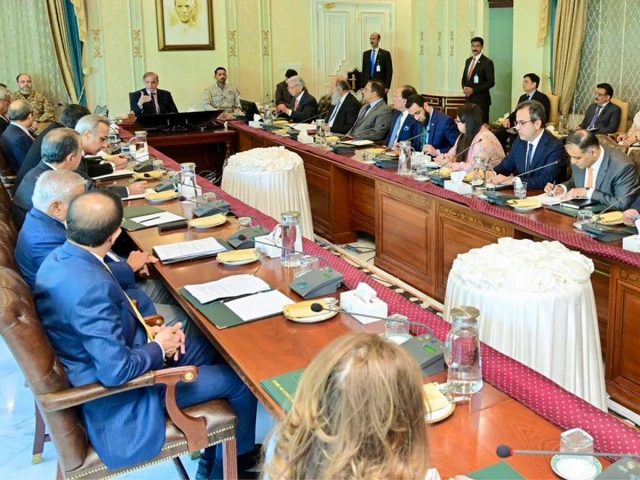Industries and farmers will receive additional electricity at preferential rates from November 2025 to October 2028.
Prime Minister Shehbaz Sharif is meeting a delegation of leading businessmen and industrialists on Thursday to discuss investments. Photo: APP
Prime Minister Shehbaz Sharif announced the Roshan Economy Electricity Package, a three-year relief initiative aimed at revitalizing Pakistan’s industrial and agricultural sectors through subsidized electricity rates.
He made the announcement during a meeting with a delegation of industrial experts and business leaders, saying the plan aimed to “revitalize production, strengthen exports and create jobs.”
Under the scheme, industries and farmers will receive additional power at concessional rates from November 2025 to October 2028. Industrial consumers currently paying Rs 34 per unit and agricultural consumers paying Rs 38 per unit will now receive additional units at a discounted rate of Rs 22.98 per unit for the entire three-year period.
“The electricity provided under the Roshan Economy Package will not be a burden on domestic consumers or any other sector,” the Prime Minister assured, while commending Energy Minister Awais Leghari and his team for developing the plan.
Read also: Federal cabinet bans Tehreek-e-Labbaik Pakistan
Shehbaz stressed that industrial and agricultural growth were essential for economic recovery. “Industrial and agricultural development are essential for economic growth and job creation. We are taking all possible measures to improve Pakistan’s regional competitiveness and ease of doing business,” he said.
He recalled that under a similar initiative launched last winter, industries and the agricultural sector consumed an additional 410 gigawatts of electricity – a measure which “helped keep the industrial wheel in motion, boosting exports and creating employment opportunities”.
Reflecting on the overall economic situation, Shehbaz said the transition from crisis to stability had been “difficult but achievable through teamwork and national determination.”
“The transition from economic crisis to stability has certainly been difficult,” he noted. “But thanks to the tireless efforts of our economic team and the cooperation of all stakeholders, we have made this possible. Once our industries and farms prosper, Pakistan will become free from the debt burden.”
Read: Pakistan resumes Afghan transit trade after 10 days of suspension
He said the country’s economic indicators had improved due to sound policy and expressed confidence that Pakistan would achieve “economic sovereignty” through continued collaboration and hard work.
During the meeting, participants reviewed the current investment climate, production costs and strategies to attract foreign investment. Business representatives also presented recommendations aimed at strengthening industrial competitiveness and reducing operational challenges.
Business leaders appreciated the government’s macroeconomic reforms, saying consistent and effective implementation of these policies could further boost investor confidence.
The meeting was also attended by Finance Minister Muhammad Aurangzeb, Economy Minister Ahad Khan Cheema, Railways Minister Hanif Abbasi, Information Minister Attaullah Tarar, Commerce Minister Jam Kamal, National Food Security Minister Rana Tanveer Hussain, IT Minister Shaza Fatima Khawaja, State Minister for Finance Bilal Azhar Kayani and senior officials from relevant ministries.




